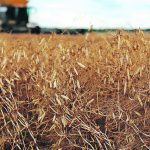Glacier FarmMedia – Pointing out a field planted with the same crop year after year is a good way to make crop pathologists wince. It means any crop-specific pathogens have multiple years to build infection load. However, rotation isn’t just about disease, a pulse and soybean expert notes. It can be a big factor when […] Read more
Tag Archives crop rotation

Fababeans could help ease rotation pressure on canola
There has been little export demand, but new, safer varieties are expected to open doors in the domestic food market
BRANDON — In a world with Netflix, YouTube and Skip the Dishes, patience is a lost art. More Canadians want things to happen, easily and immediately. Eric McLean, who farms near Oak River, Man., thinks farmers should avoid the “easy button” approach to crop production. Adding another crop to the canola-cereal rotation may not make […] Read more
U.S. researchers confirm no-till, pulse benefits
U.S. Department of Agriculture study finds that a no-till wheat and pea rotation is the most environmentally sustainable
WINNIPEG — American scientists have confirmed what Canadian farmers already know — zero tillage is good for the environment and for crop production. U.S. Department of Agriculture researchers looked at the long-term effects of three cropping rotations in Montana — summer fallow-wheat, no-till continuous wheat and no-till wheat-pea. After crunching the data, they concluded that […] Read more
Diverse rotations seen as production booster
Diverse crop rotations can benefit the performance of individual crops and the total performance of the rotation when growing conditions are difficult, says a new study from the U.S. Department of Agriculture. However, the study also found it takes a long time to see the benefits of crop diversity, and significant barriers prevent farmers from […] Read more




